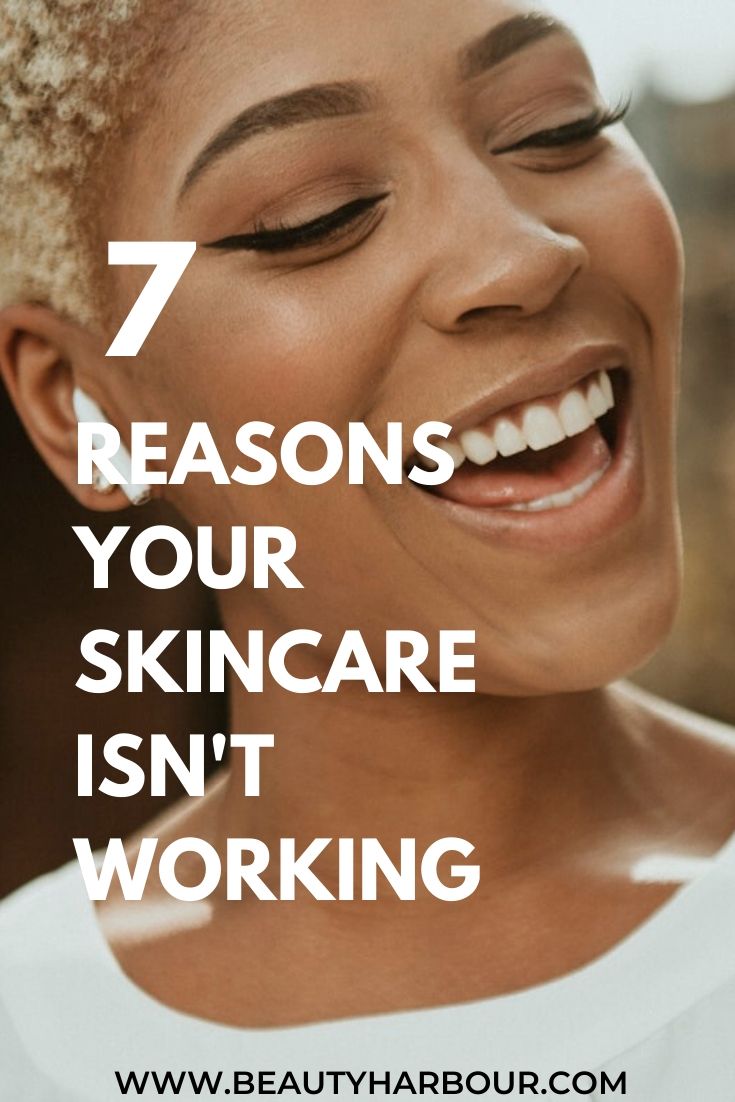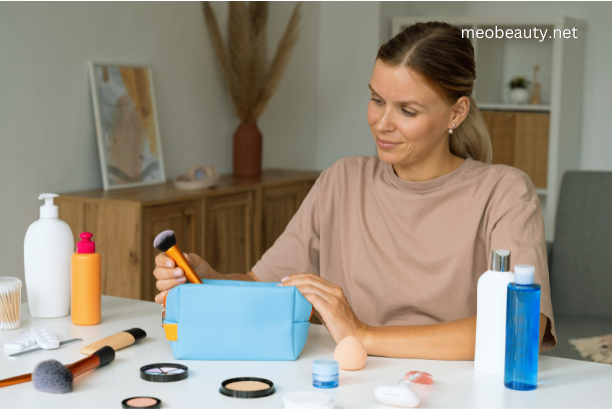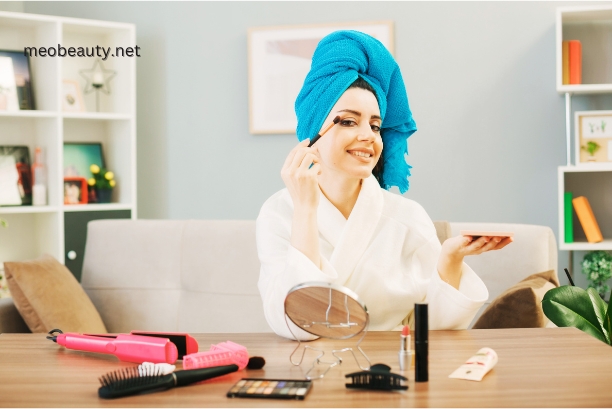Your skin care products may not be working due to either unsuitability for your skin type or incorrect application. They might also be outdated or not used consistently. “Why are My Skin Care Products Not Working”
Skin care is a crucial aspect of personal grooming, but it can be frustrating when products don’t deliver the expected results. Multiple factors could be at play, from the compatibility of the ingredients with your skin, to the product’s quality or authenticity.
It’s critical to choose formulas that align with your specific dermatological needs, whether that’s combating dryness, managing oiliness, or addressing sensitivity. The effectiveness of skin care is also heavily dependent on how you use the products; timing, sequence, and frequency are all key variables. And like many things, consistency is essential—as sporadic application won’t allow for visible, lasting improvements. Ensuring you’ve got genuine products, checking expiration dates, and following the recommended usage can turn your skincare regimen around.

Credit: www.beautifulwithbrains.com
Common Skin Care Pitfalls
Are you diligently following your skin care routine yet not seeing the results you hoped for? You’re not alone! Often, the problem isn’t the dedication; it’s the details. Here are some key reasons why your skincare might be falling short of its promised potential.
Mismatched Products And Skin Types
Finding the right skin care product can be like finding a needle in a haystack. Not every product is suitable for all skin types. Using the wrong product can aggravate skin issues rather than alleviate them. Here’s what you need to remember:
- Oily skin: Look for lightweight, non-comedogenic formulas.
- Dry skin: Seek out rich moisturizers and hydrating serums.
- Combination skin: You might need to use different products for different areas.
- Sensitive skin: Stick with products designed for sensitivity; avoid harsh ingredients.
Ignoring Product Expiration Dates
Every skincare product has an expiry date, after which, the product isn’t safe to use. Expired products can cause skin irritations and won’t perform as intended. Make sure to:
- Check the expiration date before purchase and routine use.
- Notice any changes in texture, color, or smell – they can signal that a product is past its prime.
- Store products properly, away from direct sunlight and extreme temperatures, to prolong their shelf life.

Credit: beautyharbour.com
The Importance Of Consistency
The Importance of Consistency can’t be overstated when it comes to your skincare routine. You’ve invested in quality products, expecting smooth, radiant skin. Yet, you stand in front of the mirror, feeling frustrated at the lack of results. The big question is: are you applying your skincare consistently? Your skin, like any other part of your routine, thrives on consistency. Lack of it could be why you don’t see the benefits you anticipated.
Effects Of Inconsistent Routines
Skin requires regular attention to stay healthy. Without it, even the most high-end products fail to perform. Consider these points:
- Impaired Skin Barrier: Skipping applications can weaken your skin’s defense against pollutants.
- Wasted Ingredients: Active ingredients deteriorate over time. Infrequent use might mean they never reach their full potential.
- Slower Adaptation: Skin cells need time to get used to new products. A sporadic approach disrupts this process.
Timeline For Visible Results
To gauge the effectiveness of a product, follow these guidelines:
| Timeframe | Expected Changes |
|---|---|
| 2-4 weeks | Improved hydration and texture |
| 4-8 weeks | Initial signs of decreased fine lines and even skin tone |
| 8-12 weeks | Visible diminishing of deeper wrinkles and dark spots |
Remember, this is a general timeline. Some products, like those for acne or hyperpigmentation, may take longer. Document your skin’s progress with photos to track improvements. If you follow directions and stay consistent, your skincare products have the best chance to work their magic.
Barriers To Effectiveness
Have you ever felt like your skincare routine is underperforming? It’s not just about choosing high-quality products. Several barriers can hinder their effectiveness. Unlock the full potential of your regimen by pinpointing these obstacles.
Impact Of Environmental Stressors
Environmental factors such as pollution, UV rays, and extreme temperatures take a toll on skin health. Even the best skincare products can struggle to combat these relentless aggressors. Protecting your skin from these elements is crucial for maximum product efficiency.
- UV exposure can degrade product ingredients.
- Pollutants can reduce product absorption.
- Extreme climates can alter skin’s response to products.
Counterproductive Product Combinations
Mixing certain skincare ingredients can lead to reduced effectiveness or even adverse reactions. To ensure optimal outcomes, you must understand ingredient interactions. Below is a tabulated guide on which common combinations to avoid:
| Ingredient 1 | Ingredient 2 | Effect on Skin |
|---|---|---|
| Retinol | Vitamin C | Irritation & reduced effectiveness |
| Benzoyl Peroxide | Salicylic Acid | Dryness & peeling |
| AHAs/BHAs | Retinol | Sensitivity & redness |
Before application, ensure that your product duo is safe and complementary. Proper layering and timing are key to effective skincare.
Understanding Active Ingredients
Sometimes the journey to radiant skin feels like a mystery. Your bathroom shelf might be full, but results are nowhere in sight. The solution might be right in front of you: understanding active ingredients. Knowing what’s in your products and how they work can unlock the full potential of your skincare routine.
Active ingredients are the backbone of skin care products. They target specific skin issues like wrinkles, dark spots, or acne. Not all ingredients are equal, so it’s crucial to understand which ones suit your skin type.
Concentration Matters
A crucial but often overlooked factor is the concentration of active ingredients. Too little and you won’t see changes. Too much and you risk irritation. For effectiveness without side effects, the right dosage is key.
- Peptides should be high on the ingredient list.
- Vitamin C is effective at 10-20% concentrations.
- Retinoids work well at lower percentages.
Interactions And Side Effects
Not every active plays well together. Combining certain ingredients can reduce efficacy or worsen skin. For instance, vitamin C and retinol may irritate if used together. Aim for synergy in your skin care.
| Ingredient | Use With | Avoid With |
|---|---|---|
| Retinol | Hydrators like hyaluronic acid | Vitamin C, Benzoyl Peroxide |
| AHAs/BHAs | Moisturizers to prevent dryness | Retinol on the same evening |
Noticing redness, peeling, or breakouts? These might be signs of adverse reactions. It’s essential to understand the proper use of active ingredients and monitor your skin’s response when introducing new products.
Professional Insights
Ever wondered why your shelf of skincare products seems to fail you? Let’s unlock the secrets with Professional Insights.
When To Seek Dermatological Advice
A radiant complexion eluding you despite your best efforts may demand professional help. Seek a dermatologist’s advice if you observe:
- No improvement after consistent use over several weeks
- Unexpected reactions like irritation, redness, or breakouts
- A worsening of your skin’s overall condition
Timely dermatological consultation can prevent further damage and tailor a regimen that aligns with your skin’s needs.
Customized Skin Care Solutions
Customized skincare offers a targeted approach to address individual skin concerns. The benefits include:
| Personalized Care | Effective Ingredients | Lasting Results |
|---|---|---|
| Regimens designed for your unique skin type | Concentrations suited for your specific issues | Enhanced efficacy leading to improved skin health |
A professional can identify the right ingredients and treatments for you. This personalization paves the way to visible, sustainable results.
Lifestyle Factors That Affect Skin Health
Are your skin care products not giving you the results you hoped for? Your lifestyle could be the culprit. Certain habits can impact your skin’s ability to benefit from your skincare routine. Let’s explore how your daily choices might be affecting your skin’s health.
Diet And Hydration
Your skin reflects what you eat and drink. A well-balanced diet rich in vitamins and minerals can enhance your skin’s appearance. On the flip side, consuming too many sugary or processed foods can lead to issues like inflammation and breakouts. Staying hydrated is critical too, as water helps to flush out toxins and keeps your skin cells plump and healthy.
- Eat fruits and vegetables – They are full of antioxidants which combat skin damage.
- Limited sugar intake – Reduces the chance of inflammation, which can affect skin clarity.
- Plenty of water – Aims for 8 glasses a day to maintain hydration and support skin health.
Stress And Sleep Patterns
Stress and lack of sleep can wreak havoc on your skin. Cortisol, the stress hormone, can increase oil production, which may lead to acne. Proper sleep promotes skin repair and rejuvenation.
| Factor | Impact on Skin |
|---|---|
| Stress | Increase in cortisol leading to acne and other skin issues. |
| Lack of Sleep | May slow down the skin’s natural repair processes. |
- Regular sleep schedule – Aims for 7-9 hours of quality sleep each night.
- Stress management techniques – Activities like yoga and meditation can help reduce stress levels.

Credit: www.wikihow.life
Frequently Asked Questions Of Why Are My Skin Care Products Not Working
Why Is My Skincare Routine Ineffective?
Your skincare routine might be ineffective due to misusing products, using incompatible ingredients, or inconsistent application. Skin type changes and incorrect product layering also reduce efficacy. Ensure products match your current skin needs and apply them correctly.
How Often Should Skincare Products Be Replaced?
Skincare products should generally be replaced every 6 to 12 months. Active ingredients can lose potency over time. Always check expiration dates and observe any changes in texture or smell which indicate it’s time to replace them.
Can Overusing Products Reduce Effectiveness?
Yes, overusing skincare products can lead to reduced effectiveness. It can cause skin irritation and imbalance, making the skin less responsive. Use as directed by the label or your dermatologist to avoid overuse and maintain product efficacy.
Does Skin Type Affect Product Performance?
Skin type significantly affects product performance. Products formulated for specific skin types offer optimal benefits. Using a product not suited for your skin type—be it oily, dry, combination, or sensitive—can render it less effective or even problematic.
Conclusion
Understanding your skin type is crucial for choosing the right product. Consistent usage and patience are key. Remember, what works for one might not work for another. Seek professional advice to tailor your skincare regime, and don’t be discouraged by setbacks.
Your ideal skin can be attainable with the right approach.









Leave a Reply